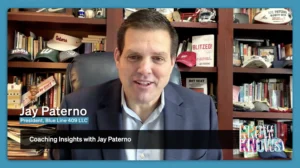Why Coaches are Trading Sensors for Video & AI
The fans remember the highlights but the franchises remember the technology, data, and inventions that powered their season. Host Tyler Kern sits down with the innovators, leaders and founders that are taking sports into the future.
With athletes just wrapping up the Olympic trials in Eugene, Oregon, and team places firmly cemented to compete in Tokyo, it is an excellent time to look at how athletes gain a competitive edge.
On this episode of Salary Capped, Host Tyler Kern talked with Jonathan Lee, Director of Sports Performance Technology, Olympic Technology Group at Intel Corp. He gave insights into how athletes get ahead of their competition with Intel’s 3D Athletic Training (3DAT).
“3DAT is a technology that we developed at Intel that allows the use of standard video and standard video cameras to capture the form and motion of athletes,” Lee said. “We use AI and computer vision to detect different points on the body, and we can reconstruct a 3D skeleton of the athletes.”
They do this without special suits or markers, so athletes are unburdened from wearing sensors or deviating from their regular training program. Using the 3D information, they can extract information about mechanics and how they perform and move.
“3DAT is a technology that we developed at Intel that allows the use of standard video and standard video cameras to capture the form and motion of athletes.” – Jonathan Lee
Elsewhere, athletes are using wearables to gain a competitive edge. An example of this would be the use of continuous glucose monitors in athletes to improve metabolic performance. Another example would be a pack an athlete wears to track movement during a soccer match. But, the folks at Intel wanted to track an athlete’s natural movement during a game or practice to gain performance insights.
“The wearables and sensors that exist now, they say where a player or athlete is now, so almost like you’re tracking a dot,” Lee said. “As opposed to us, we’re tracking how they move. When you get in that space, usually that kind of analysis is done with many sensors or in a lab.”
Listen to Previous Episodes of Salary Capped Right Here!
Follow us on social media for the latest updates in B2B!
Twitter – @MarketScale
Facebook – facebook.com/marketscale
LinkedIn – linkedin.com/company/marketscale









